Redditor Gets Applauded For Refusing To Get Rid Of Her Pet Chicken Because It Makes Her Neighbor Uncomfortable
Chickens may be viewed by some as purely farm creatures. However, keeping pet chickens in a house in a city or suburb is fairly common as long as local laws allow it.
Choose from a variety of poultry breeds, such as Silkies, Rhode Island Reds, Easter Eggers, and Brahmas. The colors and sizes of these varieties also vary.
Chickens are relatively peaceful and easy-to-care-for pets. They do require some room for housing, but their diet is fairly simple, and in exchange for your assistance, they typically provide you with fresh eggs.
Since chickens live in sociable flocks, you should purchase more than one. If handled gently from an early age, they can learn to feel at ease around people.
Many pet chickens appreciate being petted and being around their caregivers. While some don't mind being lifted, others would rather not be restrained.
The OP's pet chicken, Lucy, is one who loves to follow the OP around the house and garden, and they enjoy having her around. However, the OP's neighbor has complained several times that the chicken's presence makes her uncomfortable and that the OP should get rid of it.
The OP tried to be understanding, but the neighbor still wanted Lucy to go. Of course, no one will let go of their beloved pet that easily, and the OP was determined to keep her pet around.
The Title...
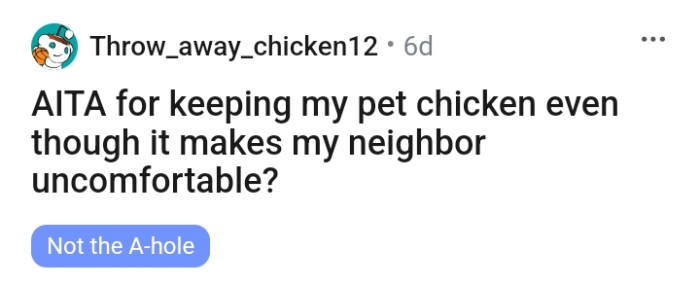
The OP's neighbor finds the pet chicken in the garden unsettling
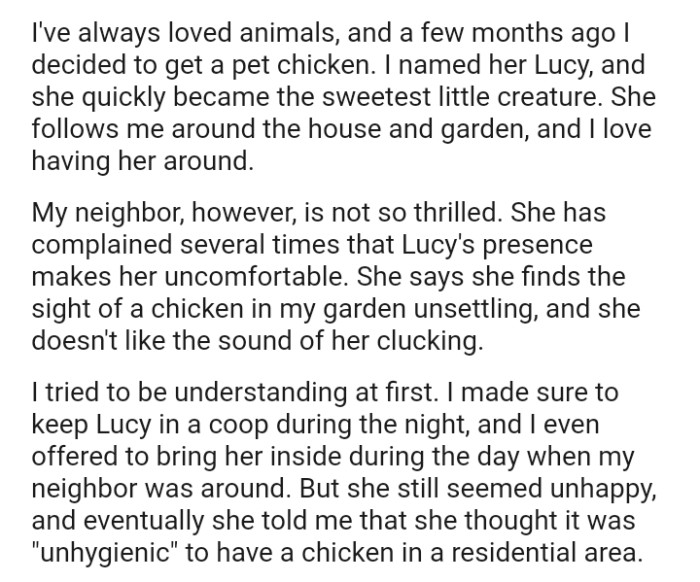
The neighbor is still insisting the OP's chicken has got to go
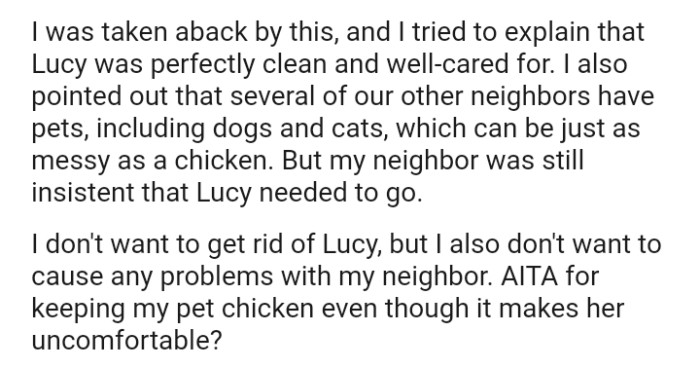
Understanding Neighbor Dynamics
Social psychology suggests that discomfort can arise from perceived breaches of social norms, such as having unconventional pets in residential areas. Research by Dr. John C. Turner on social identity theory indicates that people derive a sense of belonging from group norms. When these norms are challenged, as in the case of pet chickens, it can create discomfort or even hostility among neighbors.
Therefore, the neighbor's reaction likely stems from a fear of the unfamiliar rather than an objective assessment of hygiene.
When addressing discomfort in community settings, fostering open communication is key. A study from the Journal of Community Psychology indicates that collective problem-solving significantly enhances relationships among neighbors. Engaging in discussions about local regulations and shared responsibilities can help align expectations.
By prioritizing transparency and collaboration, both the pet owner and neighbor can work towards a resolution that respects individual needs.
The Social Dynamics of Pet Ownership
Pets often become focal points in neighborhood relationships, significantly influencing social dynamics.
Studies in community psychology suggest that pets can both enhance and complicate neighborly relations, depending on individual perceptions and cultural norms.
According to Dr. John Gottman, a renowned marriage researcher, "Pets can serve as social catalysts, fostering connections among neighbors while also highlighting differences in values and lifestyles." This sentiment is echoed by Dr. Ian Kerner, a sex therapist, who notes that "the presence of pets can create both bonding opportunities and potential conflicts, depending on how individuals perceive their roles in the community." Understanding these dynamics is crucial, as cultural attitudes towards pets can vary widely and impact how people respond to others' choices.
Let's head into the comments and read what other Redditors have to say regarding this story

There aren't rules against keeping chickens

The more life-like, the better

According to research published in the Journal of Environmental Psychology, people's attitudes towards animals can vary significantly based on cultural and personal experiences. This suggests that the neighbor's discomfort with the chicken may reflect broader societal views rather than an individual issue.
Understanding this can help pet owners navigate such conflicts more effectively by fostering dialogue that addresses underlying fears and misconceptions about unconventional pets.
Experts in pet behavior assert that discomfort about pets often stems from personal beliefs about hygiene and safety, which can lead to conflicts.
Understanding these feelings can help neighbors communicate their concerns without escalating tensions.
Research shows that finding common ground, such as discussing local pet ordinances, can facilitate better understanding.
This Redditor wants the OP to get more chickens
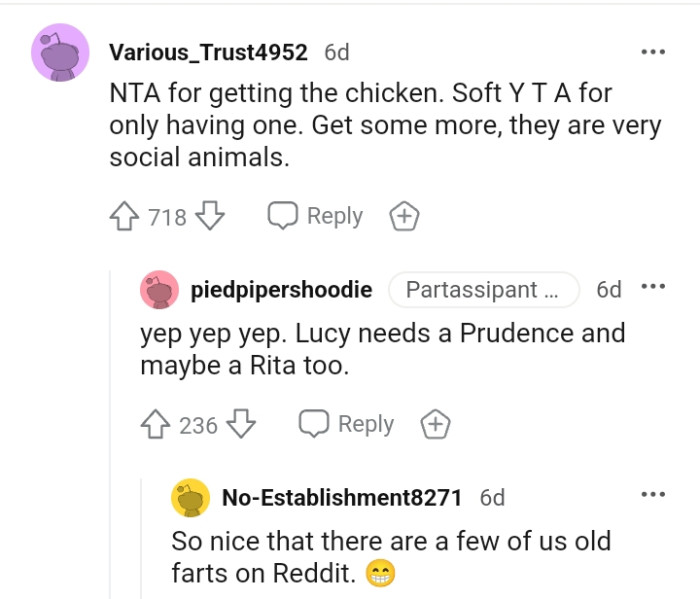
They tend to benefit from fellow birds of a feather
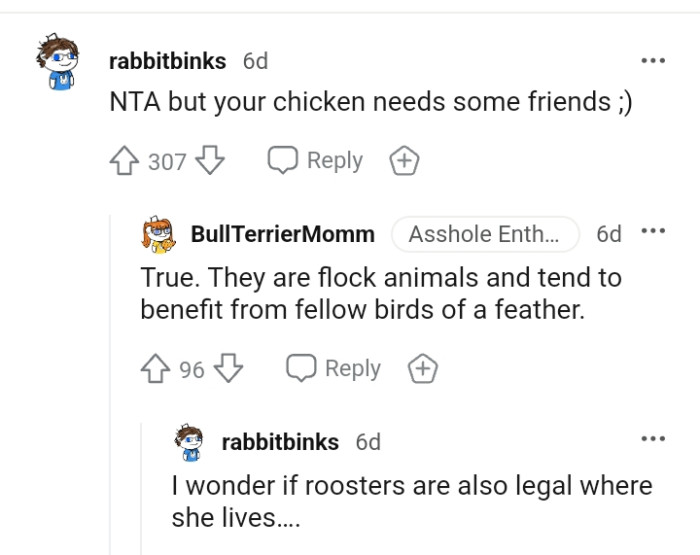
Your neighbor is hung up on some weird things
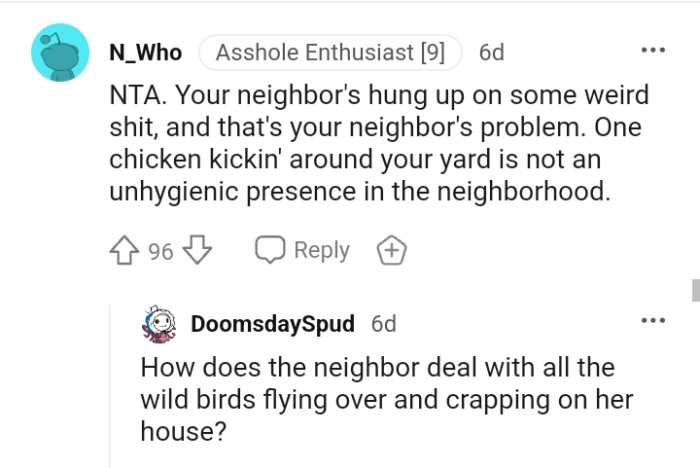
Coping with Social Conflict
Conflict resolution strategies can be essential for maintaining harmony in neighborhood relationships. Psychologists recommend using 'I' statements to express feelings without assigning blame. For instance, saying, 'I feel uncomfortable when I hear complaints about my pet' can open a constructive dialogue.
Moreover, active listening helps both parties feel heard and can facilitate a compromise that respects both the pet owner's rights and the neighbor's comfort.
Navigating Neighborhood Conflicts Over Pets
Dr. Sarah Jenkins, a social psychologist, emphasizes the importance of empathy in resolving conflicts about pet ownership.
Her studies suggest that listening to neighbors' concerns can lead to cooperative solutions that benefit everyone involved.
Engaging in open dialogue helps create a sense of community and understanding, ultimately reducing tensions.
Your neighbor needs to mind her own business

The neighbor can create real problems based on HOA rules
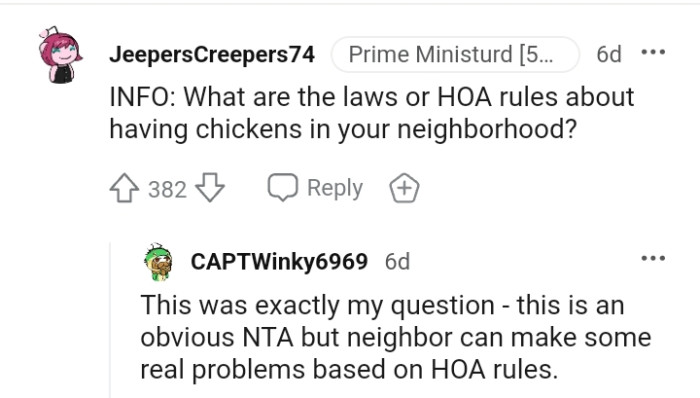
The neighbor might try to harm the OP's chicken

Dr. Judith M. Collins from Harvard Medical School emphasizes the importance of empathy in resolving interpersonal disputes. Her research suggests that empathy can significantly reduce anger and resentment, leading to more amicable outcomes.
By acknowledging the neighbor's feelings while asserting the right to have a pet, the chicken owner can foster a more constructive interaction. This approach can help bridge the emotional gap and create a more understanding neighborhood environment.
When disagreements arise over pet ownership, experts recommend hosting a neighborhood meeting to discuss concerns collectively.
This approach can foster collaboration and create solutions that address everyone's needs.
Additionally, exploring options for pet etiquette, such as leashing and cleaning up, can enhance neighborhood relations.
She is trying to make it your problem
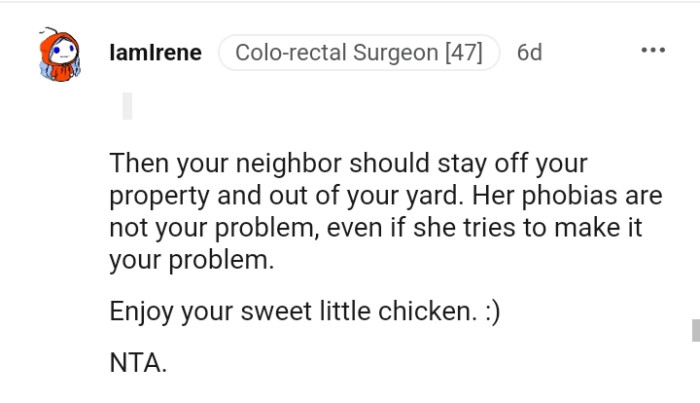
She doesn't get a say in what goes on in your house
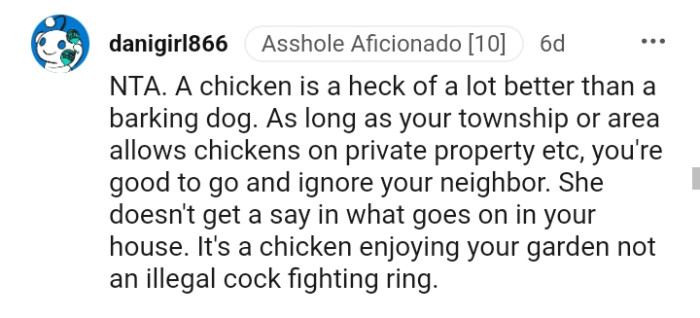
Keeping the chicken and ignoring the neighbor
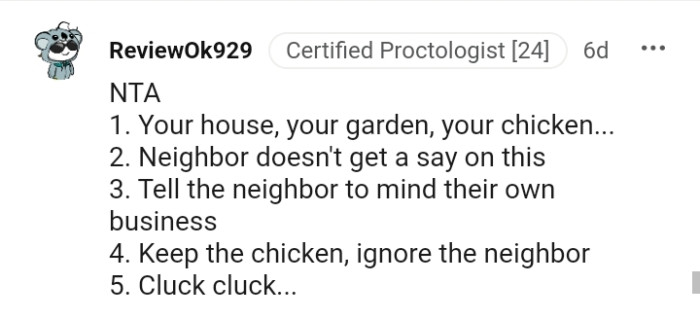
The Role of Personal Values
Values play a crucial role in how individuals perceive and react to non-traditional pets like chickens. According to a study by Dr. Susan W. Smith, values related to sustainability and animal rights can lead to more favorable views toward keeping chickens as pets.
Conversely, individuals who prioritize cleanliness and social conformity may view such situations negatively. Recognizing these differing values can help in navigating conflicts and finding common ground.
They can move to a chicken-free zone

As long as the chicken is allowed in your neighborhood, you're good
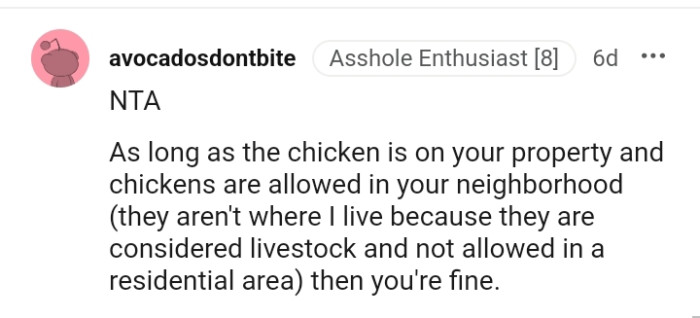
Your neighbor doesn't have to engage with the chicken
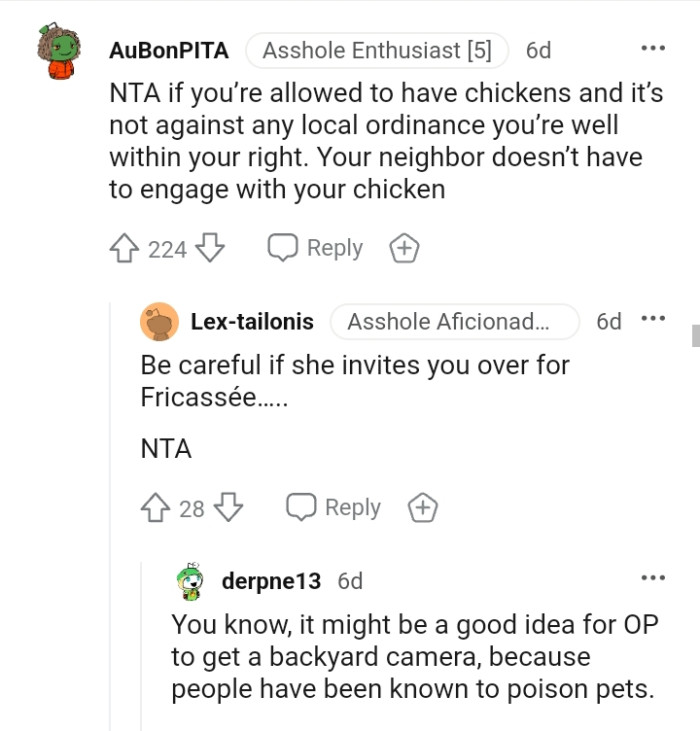
Research indicates that sharing personal stories can foster understanding and reduce conflict. According to Dr. Susan David, an emotional agility expert, "Narrative sharing can create pathways to empathy, allowing individuals to connect on a deeper level." Pet owners might share their positive experiences with their chickens, illustrating the joy and benefits of pet ownership, which could mitigate their neighbor's discomfort.
The OP should find out the legal position
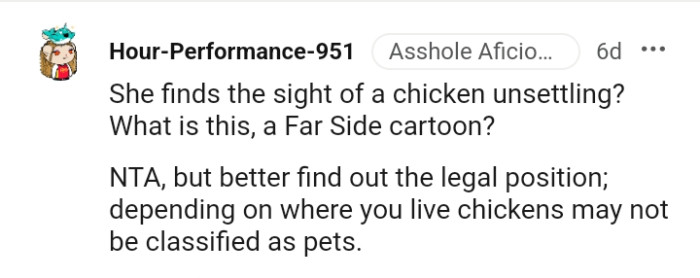
She can try not looking at the OP's garden
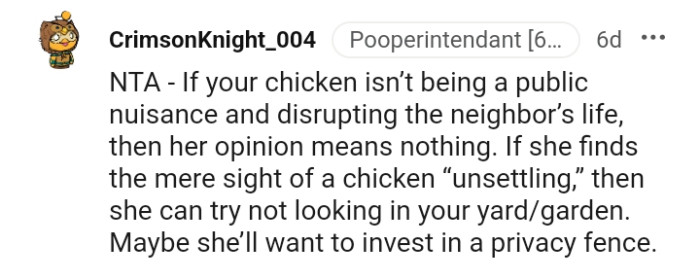
The neighbor must have some irrational phobias
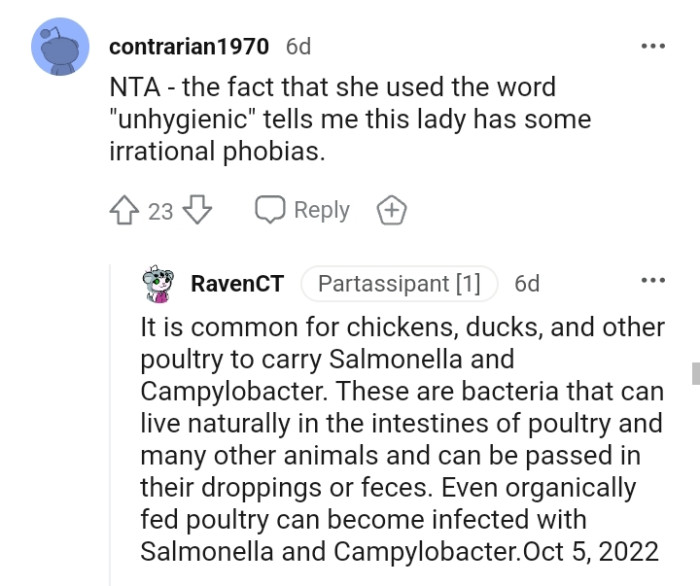
Community Building Through Pets
Pets can serve as a bridge for community engagement. Research by Dr. Karen Allen at the University of Buffalo shows that pet ownership can enhance social interactions and community ties. By organizing neighborhood gatherings centered around pets, owners can help demystify the presence of chickens and foster acceptance.
Such initiatives can also provide opportunities for neighbors to share their values, potentially reducing feelings of discomfort.
The OP is good as long as no rule is being violated
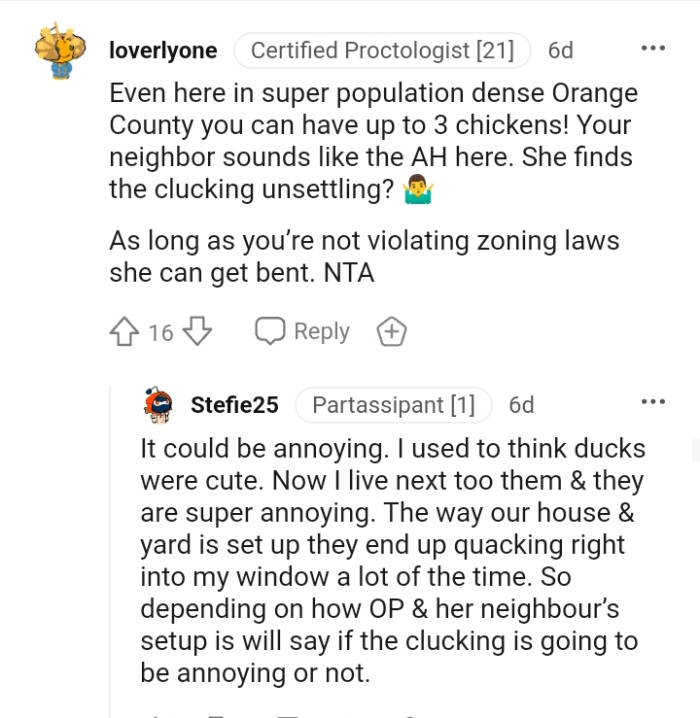
Lucy is really living the life
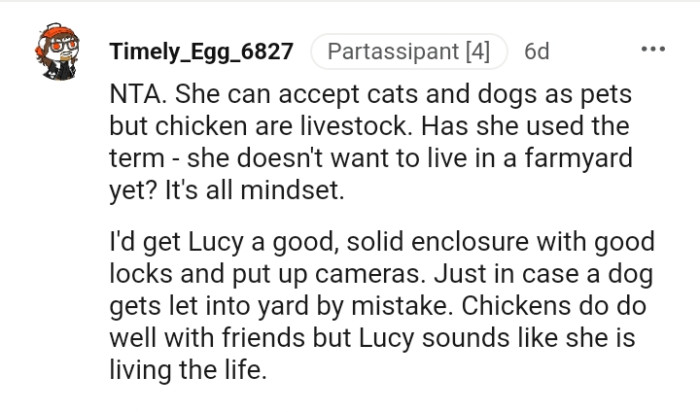
Chickens can be peaceful, relatively low-maintenance companions. Additionally, they usually provide an excess of eggs, and you'll have the assurance that the eggs came from well-treated animals.
However, chickens do require a unique housing arrangement and some room to wander. The OP provided all these, so Redditors couldn't help but make the final verdict in her favor.
Psychological Analysis
This situation highlights how differing perceptions of pet ownership can create friction among neighbors, often influenced by cultural attitudes and personal experiences.
Understanding these dynamics is crucial for navigating conflicts and fostering a sense of community.
Analysis generated by AI
Analysis & Alternative Approaches
Neighborhood conflicts regarding pets are common and often arise from differing values and beliefs.
Research supports that open communication and empathy can lead to effective conflict resolution.
Ultimately, fostering a sense of community is essential for harmonious living.
Behavioral Analysis & Pathways Forward
Psychological insights underscore the complexities of neighborly relationships, particularly when unconventional choices lead to discomfort. By understanding different perspectives and employing effective communication strategies, individuals can navigate these challenges more successfully. As highlighted by research from the American Psychological Association, fostering empathy and open dialogue is crucial for conflict resolution.
Ultimately, building a supportive community often requires compromise and understanding, allowing for diverse lifestyles to coexist harmoniously.



